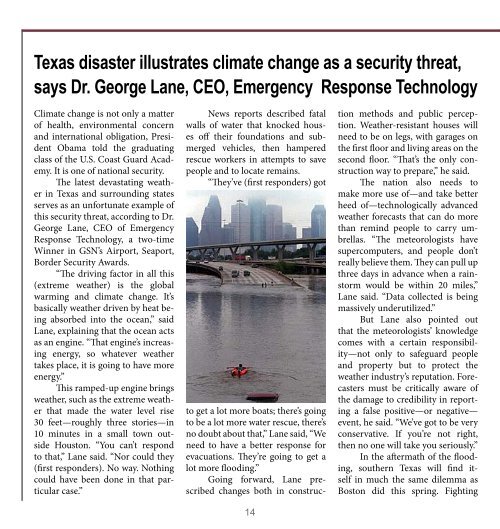Government Security News
You also want an ePaper? Increase the reach of your titles
YUMPU automatically turns print PDFs into web optimized ePapers that Google loves.
Texas disaster illustrates climate change as a security threat,<br />
says Dr. George Lane, CEO, Emergency Response Technology<br />
Climate change is not only a matter<br />
of health, environmental concern<br />
and international obligation, President<br />
obama told the graduating<br />
class of the U.S. Coast guard academy.<br />
it is one of national security.<br />
The latest devastating weather<br />
in texas and surrounding states<br />
serves as an unfortunate example of<br />
this security threat, according to Dr.<br />
george Lane, CEo of Emergency<br />
Response technology, a two-time<br />
Winner in gSN’s airport, Seaport,<br />
Border <strong>Security</strong> awards.<br />
“The driving factor in all this<br />
(extreme weather) is the global<br />
warming and climate change. it’s<br />
basically weather driven by heat being<br />
absorbed into the ocean,” said<br />
Lane, explaining that the ocean acts<br />
as an engine. “That engine’s increasing<br />
energy, so whatever weather<br />
takes place, it is going to have more<br />
energy.”<br />
This ramped-up engine brings<br />
weather, such as the extreme weather<br />
that made the water level rise<br />
30 feet—roughly three stories—in<br />
10 minutes in a small town outside<br />
Houston. “You can’t respond<br />
to that,” Lane said. “Nor could they<br />
(first responders). No way. Nothing<br />
could have been done in that particular<br />
case.”<br />
<strong>News</strong> reports described fatal<br />
walls of water that knocked houses<br />
off their foundations and submerged<br />
vehicles, then hampered<br />
rescue workers in attempts to save<br />
people and to locate remains.<br />
“They’ve (first responders) got<br />
to get a lot more boats; there’s going<br />
to be a lot more water rescue, there’s<br />
no doubt about that,” Lane said, “We<br />
need to have a better response for<br />
evacuations. They’re going to get a<br />
lot more flooding.”<br />
going forward, Lane prescribed<br />
changes both in construction<br />
methods and public perception.<br />
Weather-resistant houses will<br />
need to be on legs, with garages on<br />
the first floor and living areas on the<br />
second floor. “That’s the only construction<br />
way to prepare,” he said.<br />
The nation also needs to<br />
make more use of—and take better<br />
heed of—technologically advanced<br />
weather forecasts that can do more<br />
than remind people to carry umbrellas.<br />
“The meteorologists have<br />
supercomputers, and people don’t<br />
really believe them. They can pull up<br />
three days in advance when a rainstorm<br />
would be within 20 miles,”<br />
Lane said. “Data collected is being<br />
massively underutilized.”<br />
But Lane also pointed out<br />
that the meteorologists’ knowledge<br />
comes with a certain responsibility—not<br />
only to safeguard people<br />
and property but to protect the<br />
weather industry’s reputation. Forecasters<br />
must be critically aware of<br />
the damage to credibility in reporting<br />
a false positive—or negative—<br />
event, he said. “We’ve got to be very<br />
conservative. if you’re not right,<br />
then no one will take you seriously.”<br />
in the aftermath of the flooding,<br />
southern texas will find itself<br />
in much the same dilemma as<br />
Boston did this spring. Fighting<br />
back against a record snowfall that<br />
topped 108 inches, Boston had to<br />
invent new ways to pile its snow<br />
while digging out; photos of at least<br />
one persistent snow pile made news<br />
in May. Parts of texas will have a<br />
similar issue with flood water, Lane<br />
predicted. “There’s so much of it, it<br />
will probably be the end of July till<br />
they get back to normal,” he said.<br />
This standing water will become<br />
stagnant water mixed with<br />
raw sewage runoff in a wider-thanexpected<br />
area across the warm<br />
South—compounding the situation.<br />
“That’s called a breeding ground for<br />
mosquitos,” Lane said. “There might<br />
be epidemics of various diseases carried<br />
by mosquitos because there are<br />
going to be millions of them all over<br />
the South. …Emergency responders<br />
know this; the entire state now<br />
has to be sprayed. There’s just not<br />
enough material available to use—<br />
which might be like running out of<br />
salt for deicing the Northeast.”<br />
Weather extremes could make<br />
these kinds of scenarios—and their<br />
problematic recovery—more prevalent<br />
nationwide. Lest those living<br />
outside the southern shoreline or<br />
the storm-studded Midwest consider<br />
themselves immune from the ravages<br />
of climate change,<br />
Lane shared tales of lake<br />
effect snow hitting him<br />
from three different directions<br />
on the upper<br />
Michigan peninsula.<br />
“Don’t think ‘They’ve got<br />
it made because they’re<br />
inland.’”<br />
Lane recalled how,<br />
only two years ago, Hurricane<br />
Sandy battered<br />
the East Coast, and again emphasized<br />
the power of a vast, overheated<br />
ocean. “The takeaway is this is<br />
what we’re seeing when you get heat<br />
caused by global warming absorbed.<br />
… The temperature in the oceans is<br />
the driving factor in weather, period,<br />
the driving factor in a hurricane.<br />
The more energy you have, the more<br />
extreme the swings in weather.”<br />
Looking ahead, Lane provided<br />
several scenarios illustrating<br />
how weather extremes could impact<br />
personal safety, safety of cities and<br />
ports, even the economy—echoing<br />
the warning obama shared with<br />
the graduating guardsmen. The<br />
president predicted impacts on the<br />
economy, as rising oceans threaten<br />
thousands of miles of highways, railways,<br />
energy facilities and military<br />
installations; greater risks of natural<br />
disaster that increase refugee migrations<br />
and heighten conflicts over<br />
food and water; aggravation of poverty<br />
and political instability that can<br />
lead to terrorists and other violent<br />
actions.<br />
Leaders around the<br />
world agree that climate<br />
change is a security concern.<br />
Secretary of State<br />
John Kerry reported<br />
that climate change and<br />
security was a prime<br />
discussion among leaders<br />
on his recent trip to<br />
George Lane asia. France’s influential<br />
Environment Minister<br />
Segolene Royal, in advance of<br />
a meeting about reducing global<br />
emissions, told the associated Press,<br />
“The climate question is also at the<br />
heart of the security question.”<br />
14 15







